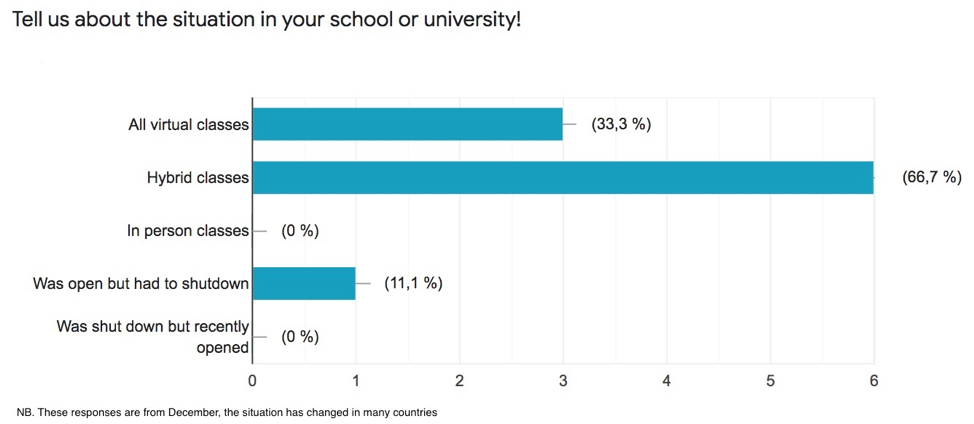Emma’s Update: Student Advice on Coping With the Pandemic
With the holidays come many expectations related to tradition, which for the most part were not met this year due to the coronavirus crisis and soaring cases in many countries. This brought about increased restrictions regarding social distancing which is very unusual for this usually very social time of the year. For example, France and England have had to tighten their restrictions between Christmas and New Year's Eve; England added a fourth tier to its initial three-tier system, which essentially meant complete lockdown, and France changed its curfew from 8pm to 6pm nationally. I feel like this has made the holidays a particularly hard time for a lot of people regarding mental health, maybe making them realize that they hadn’t been coping with loneliness and other emotions related to isolation as well as they thought. More generally, winter has also brought about colder, shorter days, which definitely don’t help on the mental health front. Furthermore, many people have not been able to reunite with their families and loved ones for the holidays due to travel bans and social distancing. I was not able to see my dad much or my grandparents at all, but I am eternally grateful to have spent the holidays with the rest of my family, especially knowing that it was a privilege this year.
The start of the second semester is not making this situation any easier for students. Going back to university is a big decision to make for those studying abroad and many restrictions come with this decision such as a mandatory quarantine upon arrival and not being able to go back home for the duration of the semester. This means not seeing your family for a couple of months as you can’t go back and forth between the two countries and also that not all students will decide to come back to school. Concerning England, where I am attending university, the country has now begun its third national lockdown so, naturally, all classes are online, which is another element that dissuades students from returning. Personally, I have decided to come back to my apartment in England because I have a lot of studying to do and I am a lot more productive and less distracted here. It's also nice to have a place to myself for taking my online classes. Since I live alone, I can ‘bubble’ with another household, which basically means I can see another household as if we lived together, which will definitely make lockdown a lot easier on my mental health. For all these reasons, now is an especially important time to continue the conversation about the burdening emotions social distancing and isolation give rise to. Hopefully, the advice gathered below from university students will help you!
After my last blog post about student mental health during the pandemic, I created a survey in order to gather student experience and advice for dealing with mental health while simultaneously at university and in isolation. The answers collected are from undergraduate university students studying in the United Kingdom and France, but their advice and experiences are relevant to students around the world! These students answered the survey around the end of the first semester, during which they had either hybrid classes or only online classes. A reoccurring comment was that online classes were more difficult to stay on top of and meant staying at home more, which negatively impacted their productivity and increased their feelings of anxiety, stress and frustration around the whole situation and its uncertainty. At the time of the survey, the students, both in France and the UK, were in lockdown, which made many miss their pre-coronavirus university routines, including meeting with friends as they pleased and attending in-person classes.
Thankfully, these students also had many useful tips for coping with or overcoming these challenges, as well as advice and positive thoughts for students struggling with mental health. Many have mentioned talking about these feelings, either with friends, family, professors, or seeking professional help from a therapist if you prefer talking to someone outside your circle. Remember that we are all going through this situation together, and it is most likely that your friends will understand how you feel and might be feeling the same! However, if you don’t feel like talking about it, why not pick up journaling in order to get your thoughts out of your head. Another important tip mentioned is to take advantage of any little thing that is still possible despite the restrictions. For example, in the UK, we can still meet with one person outside our household outdoors, which is an occasion to catch up with a friend while getting a breath of fresh air. If your university’s study spaces are open, take advantage of that and create a routine for yourself! Making to-do lists may help you too, so instead of thinking “I’ve got nowhere to go” in the morning, you’ll have some tasks to accomplish. Calling friends and family is also a nice distraction and a way to keep close contact with people who don’t live with you. These tips might seem obvious but as we like to say in French, “the simplest things are often the best,” and the students who answered our survey are proof that these pieces of advice work toward alleviating the negative effects of isolation on student mental health!


